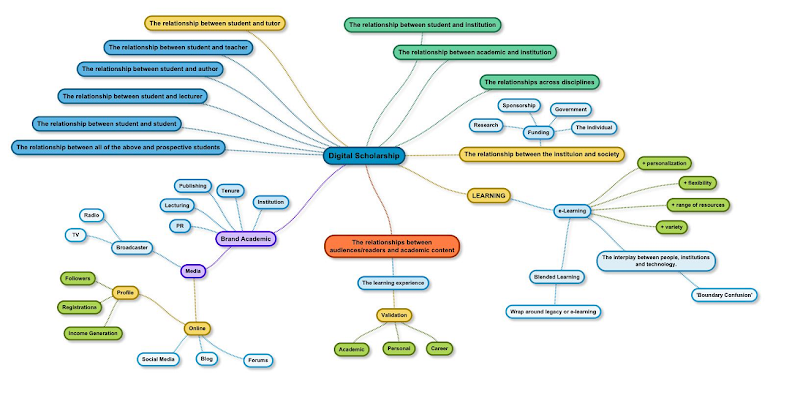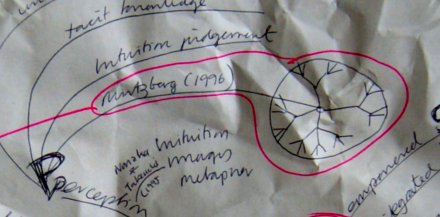‘What is the library, when the totality of experience approaches that which can be remembered?’ (Rausing, 2011:52)
Lisbet Rausing
Speaking at the Nobel Symposium 'Going Digital' in June 2009 (that ironically took another 2 years before it was published0.
Things are gong to have to speed up in the new age of digital academia and the digital scholar.
We have more than a university in our pockets (an OU course), we have a library of million of books.
(I have an iPhone and iPad. I 'borrow' time on laptops on desktops around the house, libraries at work).
I’ve often pondered from a story telling point of view what it would be like to digitize not the libraries of the world, but something far more complex, the entire contents of someone’s mind. (The Contents of My Mind: a screenplay) It is fast becoming feasible to pull together a substantial part of all that a person may have read and written in their lifetime. (TCMB.COM a website I launched in 2001)
‘Throughout history, libraries have depended on destruction’. (Rausing, 2011:50)
But like taking a calculator into a maths exam, or having books with you as a resource, it isn’t that all this ‘stuff’ is online, it is that the precise piece of information, memory support or elaboration, is now not on the tip of your tongue, but at your fingertips.
Rausing (2011) wonders about the creation of a New library of Alexandria. I wonder if we ought not to be looking for better metaphors.
‘How do we understand the web, when this also means grasping its quasi-biological whole?’ (Rausing, 2011:53)
Tim Berners-Lee thinks of Web 2.0 as a biological form; others have likeminds. But what kind of growth, like an invasive weed circling the globe?
There are many questions. In this respect Rausing is right, and it is appropriate for the web too. We should be asking each other questons.
‘Do we have the imagination and generosity to collaborate? Can we build legal, organisational and financial structures that will preserve, and order, and also share and disseminate, the learning and cultures of the world? Scholars have traditionally gated and protected knowledge, but also shared and distributed it, in libraries, schools and universities. Time and again they have stood for a republic of learning that is wider than the ivory tower. Now is the time to do so again’. (Rausing, 2011:49)
If everything is readily available then the economy of scarcity, as hit the music industry and is fast impacting on movies, applies to books and journals too.
It seems archaic to read the copyright restrictions on this Nobel Symposium set of papers and remarkable to read that one of its authors won’t see their own PhD thesis published until 2020.
‘The academic databases have at least entered the digital realm. Public access – the right to roam – is a press-of-the-button away. But academic monographs, although produced by digitised means, are then, in what is arguably an act of collective academic madness, turned into non-searchable paper products. Moreover, both academic articles and monographs are kept from the public domain for the author’s lifetime plus seventy years. My own PhD dissertation,19 published in 1999, will come into the public domain in about 110 years, around 2120’. (Rausing, 2011:55)
The e-hoarder, the obsessive scanning of stuff. My diaries in my teens got out of hand, I have a month of sweet wrappers and bus tickets, of theatre flyers and shopping lists. All from 1978. Of interest perhaps only because 10,000 teeneragers in the 1970s weren’t doing the same in England at the time.
‘We want ephemera: pamphlet literature, theatre bills, immigrant broad sheets and poetry workshops’. (Rausing, 2011:51)
What then when we can store and collate everything we read? When our thoughts, not just or writings are tagged and shared? Will we become lost in the crowd?
‘What if our next “peasant poet,” as John Clare was known, twitters? What if he writes a blog or a shojo manga? What if he publishes via a desktop, or a vanity publisher? Will his output count as part of legal deposit material?’ (Rausing, 2011:52)
The extraordinary complex human nature will not be diminished; we are what we were 5000 years ago. It will enable some, disable others; be matter of fact or of no significance, a worry or not, in equal measure.
A recent Financial Times article agrees with Robert Darnton, warning that by means of the Books Rights Registry, Google and the publishing industry have created “an effective cartel,” with “significant barriers to entry.” (Rausing, 2011:57)
Much to ponder.
‘If scholars continue to hide away and lock up their knowledge, do they not risk their own irrelevance?’ (Rausing, 2011:61)
GLOSSARY
Allemansratt : Freedom to roam
The Cloud : A Simple Storage Service that has some 52 billion virtual objects.
Folkbildningsidealet: A "profoundly democratic vision of universal learning and education"?
Incunabula: "Incunabula" is a generic term coined by English book collectors in the seventeenth century to describe the first printed books of the fifteenth century. It is a more elegant replacement for what had previously been called "fifteeners", and is formed of two Latin words meaning literally "in the cradle" or "in swaddling clothes"
Maimonedes : His philosophic masterpiece, the Guide of the Perplexed, is a sustained treatment of Jewish thought and practice that seeks to resolve the conflict between religious knowledge and secular.
Meisterstuecke : German for masterpiece.
Samizdat : An underground publishing system used to print and circulate banned literature clandestinely.
Schatzkammer : ‘Treasure Room’, and in English, for the collection of treasures, kept in a secure room, often in the basement of a palace or castle.
Schumpeterian
REFERENCE
Ruasing, L(2011) (Last accessed 23rd May 2012) http://www.center.kva.se/svenska/forskning/NS147Abstracts/KVA_Going_Digital_webb.pdf )







